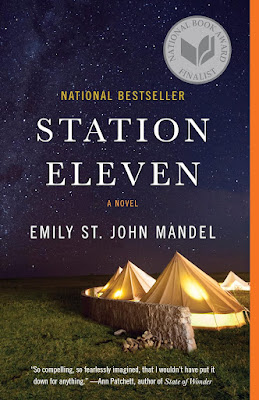Station Eleven, by Emily St. John Mandel.
An interesting fact about Station Eleven is that it's a pandemic book that was published in 2014--six years before the world experienced a real-life pandemic.
An interesting fact about me is that I'm apparently not ready to revisit a bleak, post-apocalyptic storyline. Attempting to read this book taught me that. Gripping first chapters, though.
My rating: DNF
I was excited when I saw this recommended on a top Goodreads list. Since reading Leary's The Good House two years ago, I've thought of it again and again. I try to take note when a book stays with me. Why do certain passages pop up at random times and present themselves for me to mull over again? I regularly remember instances of raw honesty in The Good House and wonder why that is.
The Foundling came about after Leary researched her family ancestry and learned that a grandmother worked at a eugenics institution in the 1920's. Fascinated by the topic, she did a deep-dive about eugenics and the institutions-turned-prisons that people were sentenced to. And it's in one such place that The Foundling takes place.
I love historical fiction, especially when it's told multi-dimensionally. Sometimes I feel that supporting characters are flat and only exist in service to the protagonist. But Leary is especially good at making realistic characters, fleshing out the people and world that she's inhabiting. This is also just a very interesting topic for a book, and I enjoyed reading it.
There are some dark themes (necessarily) and also one scene with intimacy, but nothing excessive.
My rating: 3/5
The Netanyahu's is such a weird book, guys. But it's also very good. I'd also venture that it's not for everyone. But definitely for some, and if you're a some then you don't want to miss it. Okay?
This is the fictionalized true story of a Jewish college professor Reuben Blum, who is tasked with hosting a very eccentric potential new teacher one winter. Set in the 1950's at Corbin University, the deepest hook is when you learn that this new teacher turns out to be the very unorthodox Benzion Netanyahu, who just happens to be the father of Israel's Prime Minister, Benjamin Netanyahu. Little Benji himself makes quite the appearance in this story, along with his brothers! My, oh my. (Content warning.)
I would recommend this story to anyone who loves the Northeast, academia, Jewish history, or being completely saturated in atmosphere. I was so enwrapped in Cohen's narration that I nearly needed a sweater. And I loved his writing so much. Oddly, I felt like I was learning about the author as well as the people in the story. For all I know that's a bad thing in terms of writing technique, but for my experience it only added to the enjoyment. (Highly educated, hard on himself, and with a slightly-sardonic wit.) So enamored with the writing was I that I stopped my chores several times to sit in front of my laptop and type out huge paragraphs of text from the book, reading and re-reading them each time. I even took the audiobook to my husband and made him listen to a portion of the story when I was bowled over by the clever writing.
There are too many great excerpts to put them all here, but have a sampling of the passages that I thought most excellent:
"The truth is, Dr. Morris never developed a deep Europeanist bench because he couldn’t stand the competition. Europe was his. Maps via Ptolemy and Rand McNally took up the wall of his office opposite the window. The invaded, occupied, annexed, and partitioned outposts of every European empire belonged to him, and to a few approved kronie mediocrities who knew just as well as he did that they weren’t scholastically equipped to defend themselves from challenges. This was the aspect of Dr. Morris I found most...perplexing. The man knew his limitations but wasn’t ashamed of them. He didn’t care. He wore his averageness lightly, almost proudly, like a transparent scholar’s gown, underneath which he was nakedly an administrator. His Wasp complacency was astounding, at least to a fusser like me, a child of the garment district. Nowadays they call his condition something like “privilege”, I guess. The complete calmness, the complete comfortability, the totally untroubled capacity to relax inside of ones own blanched dry dermal-girdle that comes from being swaddled in money, bonds, and stock certificates from birth."
--------------------------------------------
"It was no history. There was no past, no present, no future. Rather, there was time. As round and perfect as the earth, which from the moment it emerged from God’s spoken light, had been marked by a constant repetition—not of seasons or harvests or astro-phenomena (and the harvests they governed), but of oppression, violence, and death, between the occurrences of which was a perpetual waiting for a coming Messiah, who my public schoolmates were convinced had already come. The Messiah had already come and we--I--had failed to notice. Maybe because we--not I--were too busy being slaughtered."
--------------------------------------------
"What was Dr. Netanyahu’s work about? I was frustrated initially because I couldn’t formulate it clearly, though he couldn’t formulate it, either. But if by chance, some of the creepy priests who featured in his texts were to come to life and demand a summary and threaten to slice off one finger with dull, iron scissors, for every word I used, this is what I’d tell them: Everything you know about the Inquisition is wrong. That’s eight words, so I’d keep my thumbs."
My rating: 4/5

.png)





Comments
Post a Comment